Sponsored Content by BGI GenomicsReviewed by Olivia FrostAug 15 2023
Cervical cancer is the fourth most prevalent cancer among women on a global scale, comprising approximately 604,000 new cases and leading to 342,000 deaths worldwide.
Few diseases demonstrate global disparities as distinctly as cervical cancer. Almost 90% of the fatalities in 2020 transpired in low- and middle-income nations, which face delays in vaccination, screening, and treatment.
In August 2020, the Global Strategy for the elimination of cervical cancer was embraced by the World Health Assembly.
To be realized by the year 2030, the WHO has instituted global objectives denoted as 90-70-90: ensuring a 90% completion rate for HPV vaccination among girls by age 15; screening 70% of women between ages 35 and 45; and providing treatment to 90% of women diagnosed with cervical disease.
To bolster these ambitions, BGI Genomics has introduced a comprehensive global report on cervical cancer awareness.
This report aims to evaluate the degree of knowledge, attitudes, and practices related to cervical cancer screening and the HPV vaccine. Through an examination of these pivotal domains, this survey strives to underscore the accompanying obstacles and possibilities.
This extensive survey encompasses 1,878 women from various regions, including Brazil, the Chinese mainland, Saudi Arabia, Serbia, Thailand, and Uruguay. The results have underscored the pressing need to address barriers, enhance awareness, and improve access to screening and vaccination services.
HPV awareness affects cervical cancer screening rates: Globally, a substantial 40.0% of women were not aware that HPV is responsible for over 95 percent of cervical cancer cases. Among those uninformed about the HPV-cervical cancer link, a notable 39.1% had refrained from undergoing cervical cancer screening, surpassing the global average of 31.2%.
More choice, fewer barriers: Among women under 25 years of age, the prevalence of HPV was notably high at 22%. However, a notable 43.5% of women in the surveyed age range of 21 to 25, the highest percentage among the groups, showed reluctance due to the prospect of having a male doctor conduct a pap smear. This underscores the need to provide women, especially the younger ones, with the option of undergoing HPV DNA tests alongside pap smear screenings.
Vaccination and screening form a virtuous cycle: Cervical cancer screening was performed on 82.1% of vaccinated women, compared to 60.6% of unvaccinated women. The HPV vaccination was administered to 45.8% of tested women and 22.1% of unscreened women. Informing those who missed national vaccination programs about vaccination and screening locations and timings is crucial.
Early cervical cancer detection is vital to save lives and eventually eliminate this dreaded disease in line with WHO's global strategy. This study shows increased awareness of women could be the missing link to boost vaccination and screening rates further.
Zhang Lin, Senior Product Manager, BGI Genomics
Cervical cancer screening awareness
Early diagnosis and prompt treatment are vital for curing cervical cancer. For women in the general population, the WHO advises that they start screening at age 30 and have routine HPV screening every 5 to 10 years.
Women with HIV should get screened more frequently (every 3 to 5 years) because they have a sixfold greater risk of cervical cancer.
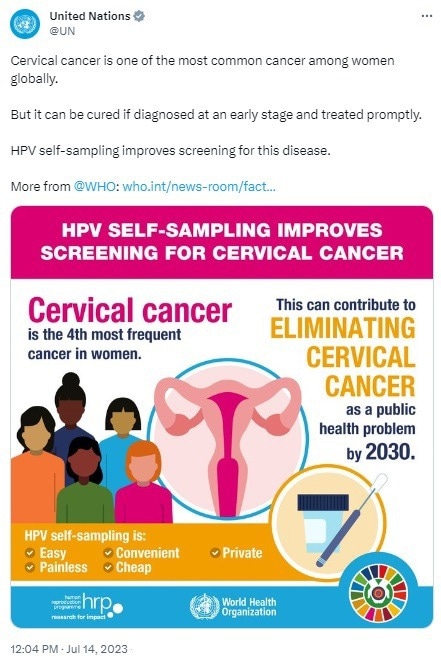
Source: UN Twitter account
Is there a screening awareness gap?
On a global scale, 40.0% of people lack awareness that HPV is responsible for over 95% of cervical cancer cases. Notably, Saudi Arabia (51.2%) and Thailand (47.3%) demonstrate the highest levels of unfamiliarity with this fact.
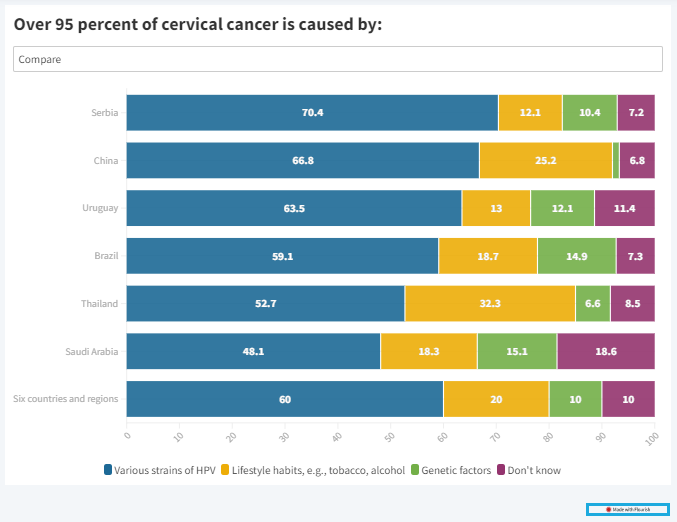
Image Credit: BGI Genomics
Furthermore, 31.2% of individuals worldwide have never undergone cervical cancer screening. Among women oblivious to the HPV-cervical cancer connection, a substantial 39.1% have never undergone screening, exceeding the global average.
Specifically, Saudi Arabia (55.8%) and Serbia (36.5%) have the highest percentages of women who have never undergone cervical cancer screening. This discrepancy highlights an awareness gap that influences cervical cancer screening rates.
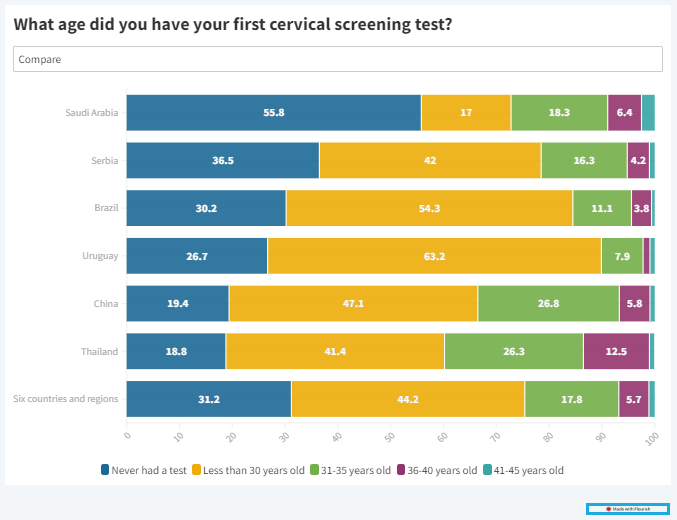
Image Credit: BGI Genomics
What do women know about cervical cancer screening?
Internationally, awareness of the pap smear (81.0%) surpasses that of the HPV DNA test (38.9%) by a factor of two. Concerning pap smears, Serbia (95.1%) and Brazil (91.1%) boast the highest levels of awareness, whereas the Chinese mainland (64.8%) and Thailand (50.5%) take the lead in HPV DNA test awareness.
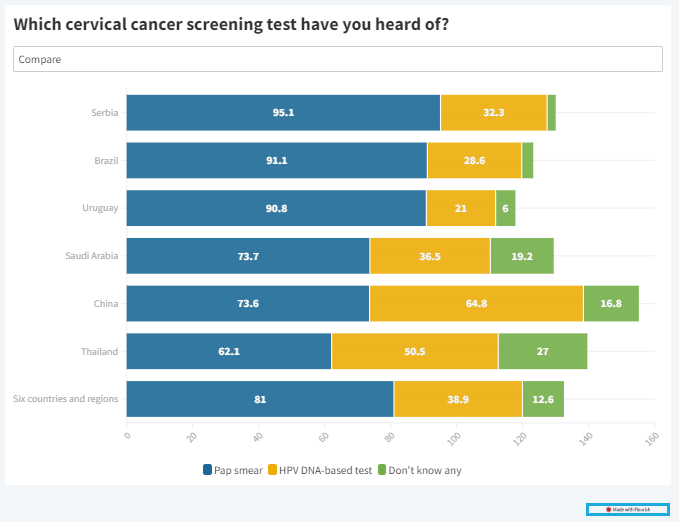
Image Credit: BGI Genomics
Furthermore, upon learning of its higher accuracy (95% accuracy rate), 88.0% of individuals worldwide are inclined to choose the HPV DNA test over a pap smear (with an accuracy range of 80-90%). The Chinese mainland (92.3%) and Thailand (94.0%) have the highest percentages of those preferring the HPV DNA test.
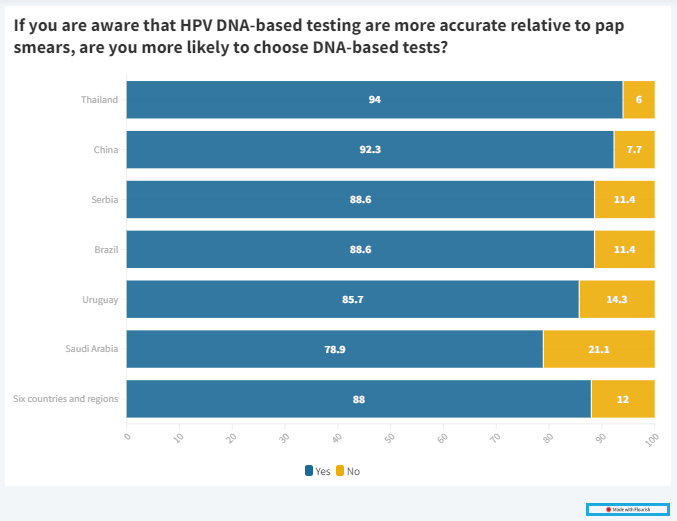
Image Credit: BGI Genomics
Regarding knowledge of HPV as a sexually transmitted virus, 77.9% of individuals worldwide are aware. This awareness is lowest in Saudi Arabia (55.3%) and the Chinese mainland (72.9%).
What's holding women back from cervical cancer screening?
The absence of symptoms (42.3%), the dread of the findings (40.7%), and the humiliation of meeting a male doctor during a pap smear (39.0%) are the main barriers to women getting screened for cervical cancer.
The countries with the highest opinions on this topic include Uruguay (55.9%), Brazil (51.1%), the Chinese mainland (59.4%), and Saudi Arabia (44.9%), all of which are concerned about the lack of symptoms.
In Saudi Arabia (51.9%) and the Chinese mainland (57.1%), there is a very strong disinclination to see a male doctor administering a pap smear. Among women aged 21-25 years, the highest among surveyed age groups, 43.5% express hesitance due to this reason.
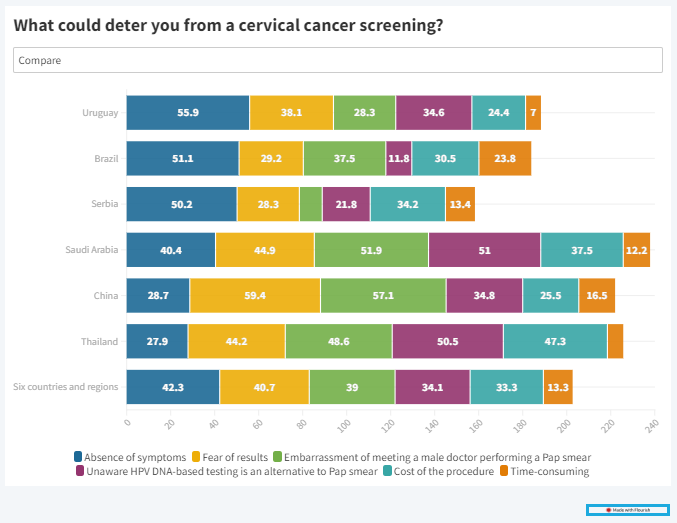
Image Credit: BGI Genomics
Conversely, a doctor's recommendation (75.9%) is the primary motivation for women to undergo cervical cancer screening. Behavior-based factors, like new sexual partners or discovering a lack of sexual monogamy in their partner, rank significantly lower at 25.5%. Doctors can inquire about symptoms and behavior-based factors to provide informed recommendations.
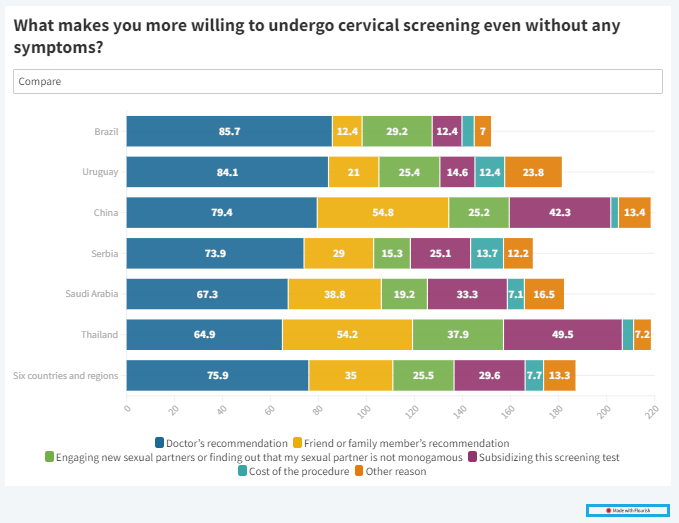
Image Credit: BGI Genomics
Cervical cancer vaccination awareness
The WHO has raised an alarming concern regarding a substantial drop in global HPV vaccination coverage due to the impact of COVID-19.
Between 2019 and 2021, the coverage of the first dose of HPV vaccination experienced a significant decline from 25% to 15%. This resulted in 3.5 million more girls missing out on HPV vaccination in 2021 compared to 2019. To counteract this downward trend, countries must intensify their efforts to enhance HPV vaccination programs.
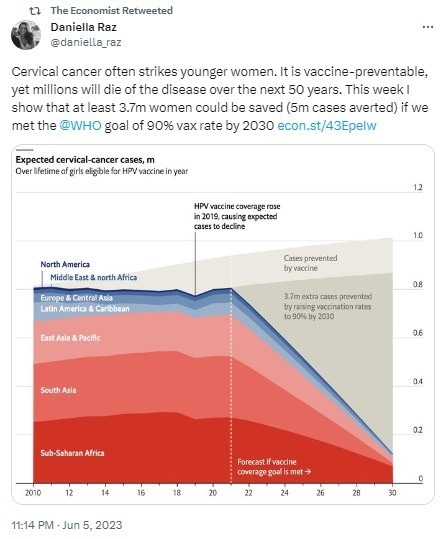
Source: The Economist's Twitter account
Is there a vaccination awareness gap?
The leading factor deterring women from cervical cancer vaccination is the lack of knowledge about where to receive the vaccine (38.7%). Following closely are the absence of symptoms (36.8%) and fear of side effects (28.6%). Countries like Thailand (50.8%) and Serbia (49.5%) exhibit the highest percentages of individuals unaware of vaccination locations.
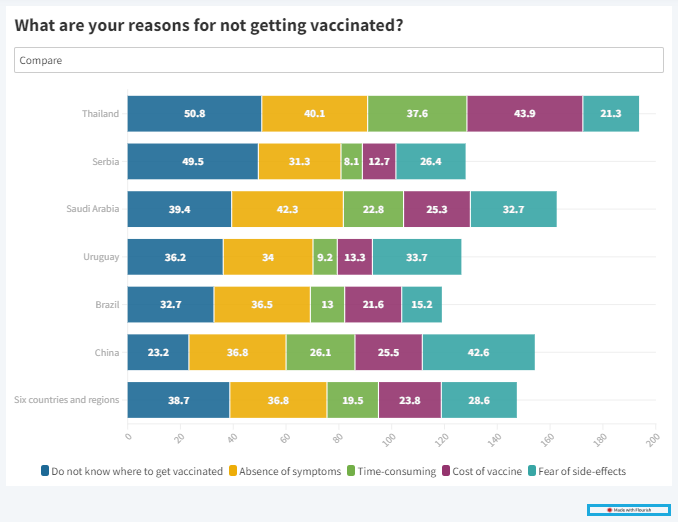
Image Credit: BGI Genomics
The HPV vaccination has been given to 38.4% of women globally. The percentages are, however, far lower in Saudi Arabia (29.5%) and Serbia (7.8%). Notably, 46.0% of women between the ages of 21 and 25 have gotten the HPV vaccination, which falls above the global average.
What do women know about cervical cancer vaccination?
HPV vaccinations should be given before exposure to HPV and sexual activity for best results. The WHO advises immunizing girls between the ages of 9 and 14 for increased protection against cervical cancer and details a precise vaccination schedule in its December 2022 position paper.
- A one or two-dose schedule for girls aged 9-14 years
- A one or two-dose schedule for girls and women aged 15-20 years
- Two doses with a 6-month interval for women older than 21 years
Regarding awareness about the WHO-recommended age range (9 to 14 years) to initiate vaccination, only 43.2% of individuals worldwide possess this knowledge. Countries like Saudi Arabia (20.8%) and Thailand (25.4%) exhibit the lowest percentages of awareness of this age range.
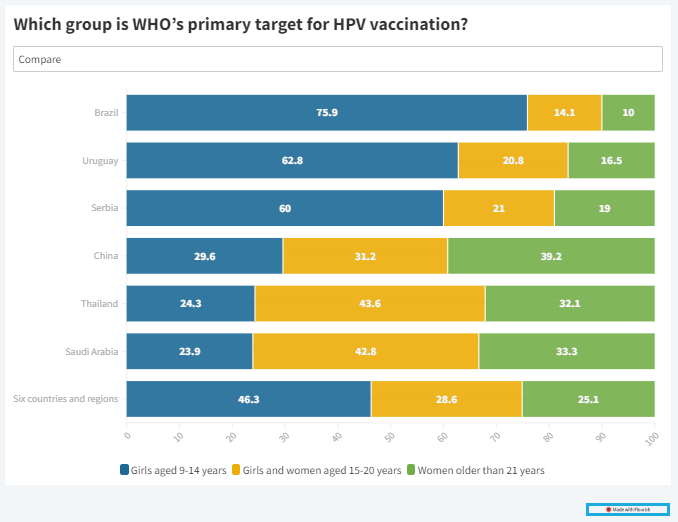
Image Credit: BGI Genomics
Merely 17.9% of the global population are familiar with the vaccination schedule for diverse age groups, such as two doses with a 6-month gap for women aged above 21 years. Brazil (10.2%) and Serbia (14.0%) demonstrate the lowest awareness of this relevant vaccination schedule.
The relationship between cervical cancer screening and vaccination awareness
The WHO emphasizes that a coordinated cervical cancer prevention strategy should encompass educating individuals about minimizing behaviors that elevate the risk of HPV infection, along with disseminating information about screening, vaccination, diagnosis, and treatment of precancerous lesions, cancer, and risk factors.
HPV vaccination serves as a primary preventive measure and does not eliminate the need for later-life screening. This is because current vaccines do not offer protection against all high-risk HPV types and exert a limited influence on disease in unvaccinated women and those vaccinated at older ages.
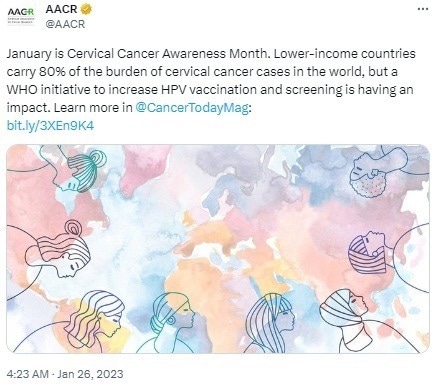
Source: American Association for Cancer Research (AACR) Twitter account
Are there synergies between screening and awareness?
Of individuals who received the HPV vaccine, a substantial 82.1% also underwent cervical cancer screening, which is much higher than the unvaccinated group's average of 60.6%. This tendency was much more prominent in Thailand, where 97.7% of immunized women chose the screening vs 61.4% of unimmunized women.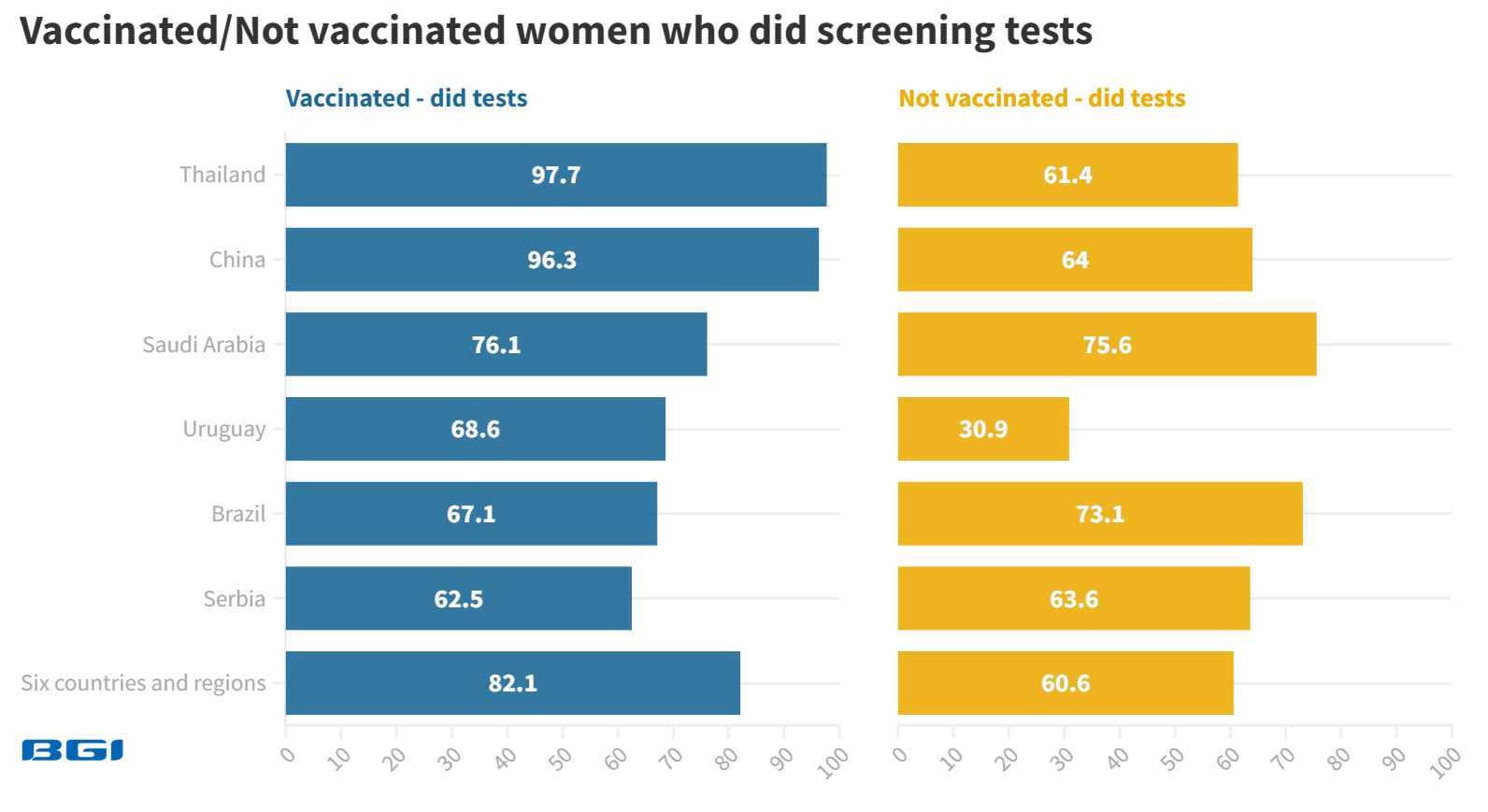 Image Credit: BGI Genomics
Image Credit: BGI Genomics
Since not all women underwent vaccination prior to screening, the study also investigated whether those opting for screening were more likely to be vaccinated. The results indicated that 45.9% of these women had received the HPV vaccine, higher than the 22.1% of unscreened women.
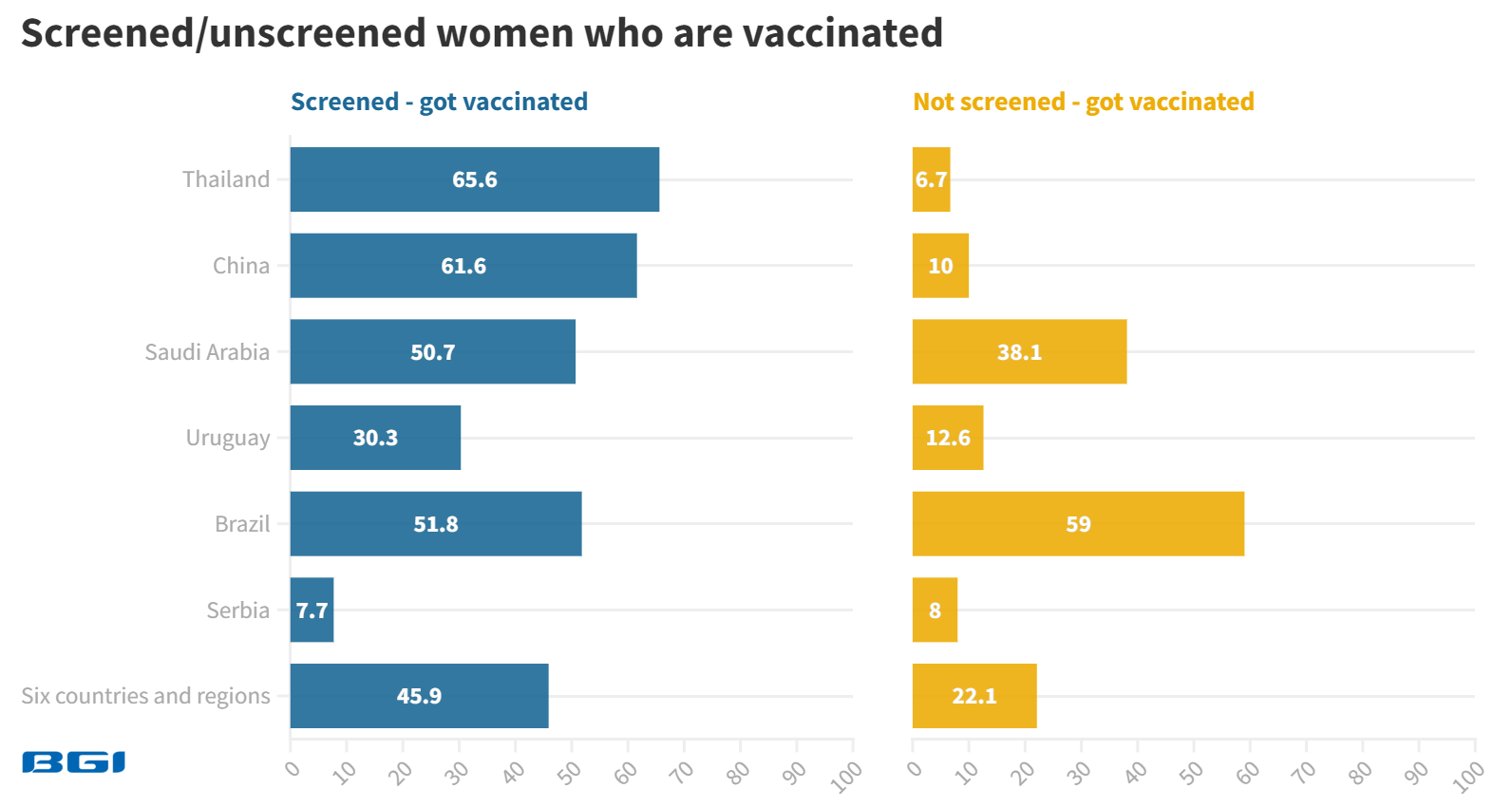
Image Credit: BGI Genomics
About BGI Genomics and SENTIS HPV tests
BGI Genomics, headquartered in Shenzhen, China, is a premier provider of integrated precision medicine solutions globally. In July 2017, it became a subsidiary of BGI Group and was officially listed as BGI Genomics (300676.SZ) on the Shenzhen Stock Exchange.
The SENTIS™ HPV test, holding a CE certification, merges self-sampling technology and genotyping assay to detect the 14 most crucial "high-risk" HPV types, which encompass HPV -16, 18, 31, 33, 35, 39, 45, 51, 52, 56, 58, 59, 66, and 68, along with 2 "low-risk" virus types, HPV -6 and 11.
Utilizing Next Generation Sequencing (NGS) technology founded on a large sample volume for each run, HPV genotyping detection reduces the testing cost per individual. In 2021, the WHO endorsed DNA testing as the primary screening method for cervical cancer prevention.
Methodology
This study is established upon an online survey involving 1,878 female participants from Brazil (315), the Chinese mainland (310), Saudi Arabia (312), Serbia (307), Thailand (319), and Uruguay (315).
These participants were situated within their respective countries or regions at the time of the survey in July 2023. Conducted in local languages, the respondents' ages ranged between 21 and 45 years. The survey was executed by Momentive Global under commission.
About BGI Genomics
BGI Genomics is the world's leading integrated solutions provider of precision medicine, now serving customers in more than 100 countries.
They provide academic institutions, pharmaceutical companies, healthcare providers, and other organizations with integrated genomic sequencing, proteomic services, clinical testing, and solutions across a broad range of applications.
They have more than 20 years of genomics experience helping customers and partners achieve their goals by delivering rapid, high-quality results using a broad array of cost-effective, cutting-edge technologies, including their own innovative DNBSEQ™ sequencing technology.
Sponsored Content Policy: News-Medical.net publishes articles and related content that may be derived from sources where we have existing commercial relationships, provided such content adds value to the core editorial ethos of News-Medical.Net which is to educate and inform site visitors interested in medical research, science, medical devices and treatments.